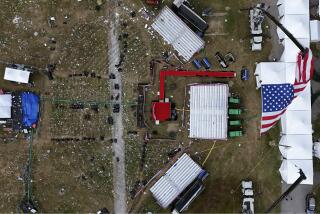FBI uses drones inside U.S. for spying, director says
- Share via
WASHINGTON — FBI Director Robert S. Mueller III testified Wednesday that the controversial National Security Agency surveillance program “has been a contributing factor, one dot among many dots” for tracking terrorist plots, and he admitted for the first time that the bureau had used surveillance drones inside the U.S.
The FBI uses drones “in a very, very minimal way and very seldom,” said Mueller, adding that “we have very few.”
Mueller’s comments were the first time an FBI official publicly acknowledged that the bureau used remotely piloted aircraft, though the Drug Enforcement Agency and the Bureau of Alcohol, Tobacco, Firearms and Explosives have both tested drones for use in investigations.
Sen. Dianne Feinstein, a Democrat from California, asked Mueller to detail what protections the FBI had put in place to limit how video and other information collected by drones was used by federal investigators. She called drones “the greatest threat to the privacy of Americans.”
“I will have to go back and check in terms of what we keep in terms of the images and the like. But it is very narrowly focused on particularized cases and particularized needs, and that is the principal privacy limitations we have,” Mueller said.
Mueller said the FBI was in the “initial stages” of writing policies to limit the effect on the privacy of American citizens. “We’re exploring not only the use but also the necessary guidelines for that use,” he added.
In what is probably his last appearance before Congress before he leaves office, Mueller told the Senate Judiciary Committee that the NSA’s use of telephone logs and Internet records was especially crucial in learning which home-grown suspects or foreign immigrants are in contact with Al Qaeda or other terrorist networks overseas.
“You never know which dot is going to be the key,” he said. “But you want as many dots as you can. And if you close down a program like this, there will be ... fewer dots to connect.”
Mueller, the sixth FBI director, said the bureau already was making transition plans for his successor, even though President Obama had not yet sent the name of a nominee to the Senate for confirmation.
Mueller said he had met with Obama to discuss his replacement, but would not detail their conversation. The White House, meanwhile, has indicated the president plans to nominate James B. Comey, a former deputy attorney general, to the post.
But, Mueller said, no matter how much the FBI prepares and who is ultimately installed to succeed him, some unexpected crime event probably will change everything. Just a week after Mueller took office, the Sept. 11, 2001, terrorist attacks instantly morphed the FBI from a traditional anti-crime organization fighting gangs and bank robberies into one with terrorism and national security as its top priority.
“It will take I would say a month to really get one’s feet on the ground,” Mueller said. “But in that month, I can tell you something’s going to happen. So whatever you planned in terms of sitting down and looking at something, something else will come up and your attention will be diverted.”
Committee members from both political parties were generous in their compliments to the outgoing director, thanking him for his 12 years of running the bureau. Some proclaimed his success in upgrading the FBI into a more sophisticated, highly technological organization to deal with an emerging world of cyber-crime, international terrorism and complex Wall Street money schemes.
But several Republicans appeared frustrated over a number of issues, including why Mueller’s FBI had not made arrests in the Internal Revenue Service political controversy, in which tea party and other conservative groups were targeted for special scrutiny.
Sen. Jeff Sessions (R-Ala.) pressed Mueller to divulge the scope and goal of the FBI’s investigation into the IRS matter, but the director provided only minimal details. He said a dozen agents were assigned to the case and that it was being directed out of the Washington field office.
“There is a sense of urgency with the investigation,” he said. “It is not languishing.”
More to Read
Sign up for Essential California
The most important California stories and recommendations in your inbox every morning.
You may occasionally receive promotional content from the Los Angeles Times.












